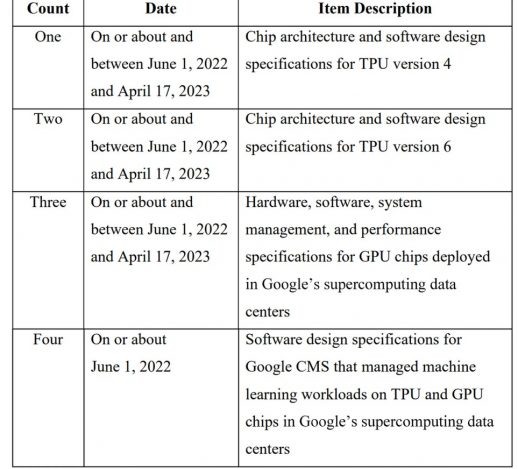The stolen materials reportedly pertain to Google’s TPU processors and data centers used for AI processing.
Linwei Ding, also known as Leon Ding, a Google engineer, was accused by a federal grand jury of allegedly stealing trade secrets related to Google’s AI chip software and hardware on March 5th. He was detained on Wednesday morning in Newark, California. Deputy Attorney General Lisa Monaco said that Ding took more than 500 sensitive files from Google containing AI trade secrets while secretly working for Chinese firms aiming to get an advantage in the AI technology competition.
The leaked data primarily concerns Google’s tensor processing unit (TPU) processors. Google’s Tensor Processing Unit (TPU) processors are used to support a variety of artificial intelligence tasks and may be used with Nvidia Graphics Processing Units (GPUs) to develop and execute AI models such as Gemini. The business has provided access to the chips via partner sites such as Hugging Face.

Allegedly stolen information includes software designs for v4 and v6 TPU chips, hardware and software specs for GPUs in Google’s data center, and designs for Google’s machine learning workloads in data centers.
As the AI arms race intensifies and the US government seeks to restrict China’s access to AI-specific chips, some Chinese enterprises are now relying on domestic chip manufacturers to support their AI systems. In late last year, intelligence leaders from the Five Eyes alliance (comprising the US, UK, Canada, Australia, and New Zealand) cautioned American tech firms about Chinese corporations possibly engaging in intellectual property theft concerning AI, quantum computing, and robots.
The government accuses Ding of moving these materials from May 2022 to May 2023 to a personal Google Cloud account.
He reportedly transferred data from Google source files to the Apple Notes program on his Google-issued MacBook laptop. He then converted the data from Apple Notes to PDFs to evade detection by Google’s data loss prevention systems.
Shortly after he started taking files, a Chinese machine learning company called Rongshu proposed to appoint him as Chief Technology Officer. He traveled to China for five months to secure funds for the company and later established and managed a machine learning startup named Zhisuan, all while maintaining his position at Google. He left Google in December 2023 and allegedly purchased a single ticket to Beijing, set to leave two days after his last day, after the company’s inquiries about his uploads.
In December 2023, the DOJ alleges that he pretended to be at Google’s US headquarters by having another employee scan his badge at the entrance while he was really in China. If convicted, Ding faces up to 10 years in jail and a $250,000 fine for each of the four charges of theft of trade secrets he has been charged with.
We have stringent measures in place to prevent the theft of our private business information and trade secrets. Upon examination, we discovered that this employee had stolen many papers, prompting us to promptly report the matter to legal authorities. Google representative José Castañeda expressed gratitude to the FBI for safeguarding their information and confirmed ongoing collaboration with them.
 Tech Gadget Central Latest Tech News and Reviews
Tech Gadget Central Latest Tech News and Reviews




